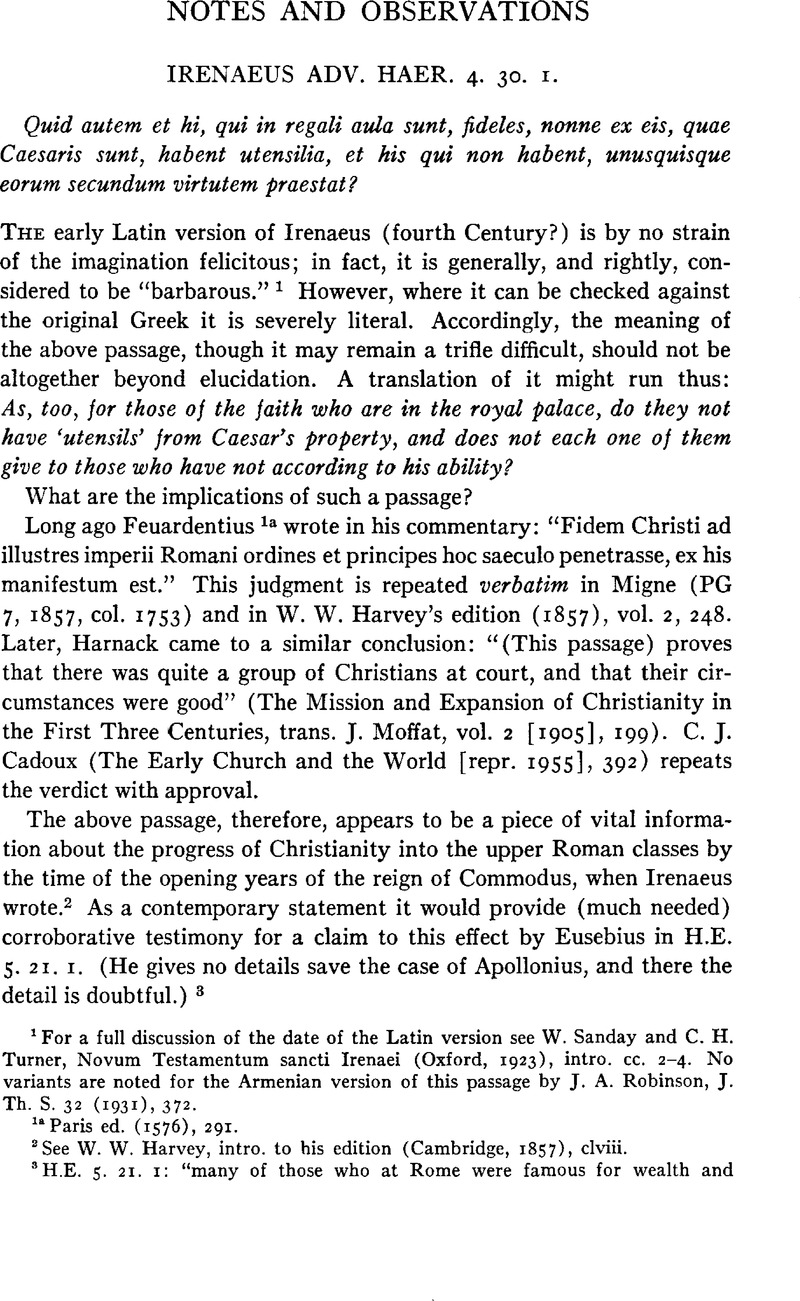No CrossRef data available.
Published online by Cambridge University Press: 10 June 2011

1 For a full discussion of the date of the Latin version see W. Sanday and C. H. Turner, Novum Testamentum sancti Irenaei (Oxford, 1923), intro. cc. 2–4. No variants are noted for the Armenian version of this passage by J. A. Robinson, J. Th. S. 32 (1931), 372.
1a Paris ed. (1576), 291.
2 See W. W. Harvey, intro. to his edition (Cambridge, 1857), clviii.
3 H.E. 5. 21. l: “many of those who at Rome were famous for wealth and turned to their own salvation with all their house and with all their kin” (tr. K. Lake). For Apollonius (Prosopographia Imperii Romani [2nd ed., 1933– ], A 931) see bibliography in J. Quasten, Patrology, I (1950), 184.
4 Florinus reappears as the subject of a Syriac fragment in a letter from Irenaeus to Pope Victor (Harvey, op. cit., II, 457).
5 Lewis and Short consider “vasa” and “utensilia” synonymous (s.v. “utensilia”). Cf. Pliny, N.H. 13. 11. 22: “Radicibus (sc. papyri) incolae pro ligno utuntur, nee ignis tantum gratia, sed ad alia quoque utensilia vasorum.”
6 11.2: “vasa argentea et aurea”; 12:35: “vasa argentea et aurea, vestemque plurimam” (vulgate) (cf. Terence, Heaut. Tim. 1.1.89: “nihil relinquo in aedibus, Nee vas nee vestimentum”). The Septuagint reads 11:2 and 12:35: σκεύη ἀργυρᾶ καὶ χρυσᾶ καὶ ιματισμóν
7 Vol. V (1880), trans. A. Roberts and W. W. Rambaut, 476. Cf. C. J. Cadoux, loc. cit., “Irenaeus speaks of them (Christians at court) in such a way as to imply that some of them derived considerable perquisites from their positions.”
8 They take their place among the (lowly) company of men such as the Cappadocian Euelpistus, companion of Justin Martyr, δοῦλος Καίσαρος (Acta Martyrum Sincera [ed. Ruinart, 1859], 104), of Proculus and Caracalla's nurse (Tert. ad Scap. 4) and possibly of “Alexamenos” (Michael Gough, The Early Christians [1961], 83–84). Men of more exalted status, like Carpophorus (ἐκ τῆς Καίσαρος οἰκίας, Hipp Philos. ix. 12 = C.I.L., VI, 13040 [Rome], “Augg. lib.”?), Julius Africanus (Oxy. Pap. iii [1903], no. 412, 11. 63–68), Ambrose (Epiphanius, Adv. Haer. LXIV. iii, τῶν διαΦανῶν ἐν αὐλαῖς βασιλικαῖς), possibly Prosenes (I.L.S. 1738), and, doubtfully, the eunuchs Calocerus and Parthenius (see D.A.C.L. XIII, 2244 ff.), tend to come a generation or more after Irenaeus wrote.